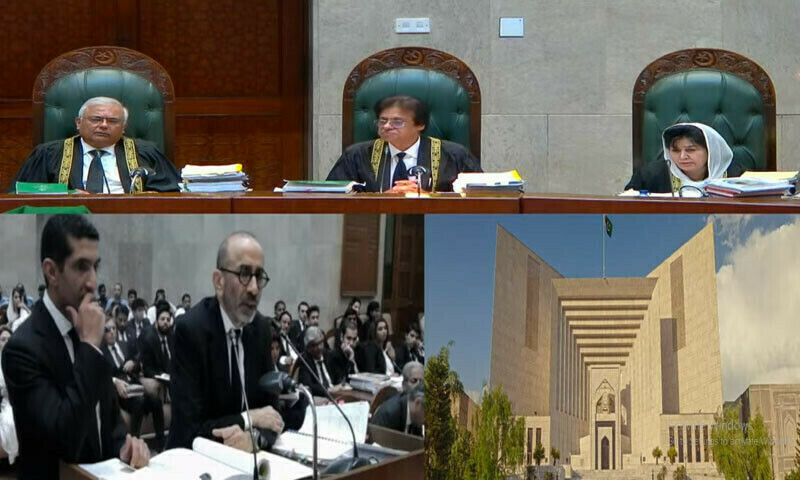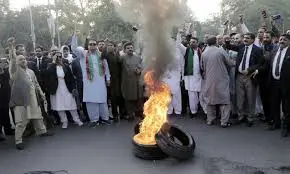Supreme Court hears live proceedings in reserved seats review case
The Supreme Court conducted a live hearing on the review case regarding reserved seats, with an 11-member bench headed by Justice Aminuddin Khan. During the proceedings, Justice Jamal Khan Mandokhail stated that the Sunni Ittehad Council (SIC) is not entitled to reserved seats.
Justice Mandokhail and Justice Hilali raise critical questions
Justice Musarrat Hilali questioned how the SIC could claim reserved seats and asked how a party not present in Parliament could include independent candidates. Advocate Makhdoom Ali Khan responded that, according to SIC, the independent candidates had joined them.
Justice Hilali further asked whether SIC contested the elections, to which the lawyer replied that the SIC did not, and its chairman had contested independently.
Justice Mandokhail reiterated that SIC was not eligible for reserved seats and noted that while it could form a parliamentary party, reserved seats could not be claimed. Justice Hilali added that only elected independents could join a party that had secured seats in Parliament.
Makhdoom Ali Khan concludes arguments
Makhdoom Ali Khan argued that members elected on reserved seats had been de-notified without prior notice. Justice Muhammad Ali Mazhar remarked that the court had already nullified the Election Commission’s notification.
Makhdoom Ali Khan explained that the SIC had approached the court under Article 185(3), and the issue before the court was the Election Commission’s notification. He argued that anyone potentially affected by the notification should have been issued notice and pointed out that the verdict lacked reference to Article 225, which states that election matters cannot be questioned otherwise.
Justices discuss constitutional interpretations
Justice Mandokhail asked how Article 225 applied, and Justice Mazhar clarified that the case involved proportional representation. Makhdoom Ali Khan emphasized that reserved seat lists are submitted before elections, and any error in nomination papers is handled by the tribunal.
Justice Mandokhail remarked that if Makhdoom’s argument were accepted, the Peshawar High Court would lack jurisdiction. Makhdoom countered that notifications had not yet been issued at the time and stressed that unconstitutional decisions should be rectified by the court.
He also explained that if a majority of justices upheld the original ruling, the review would be dismissed.
Role of PTI and eligibility questioned
Justice Shahid Bilal asked whether PTI was a party to the case and whether a non-party could be awarded seats. Makhdoom Ali Khan responded that only parties to the case could receive seats and cited Justice Yahya Afridi’s opinion that PTI was not a party.
Justice Mandokhail said the court’s focus was on the Election Commission’s role, which, in his view, had failed in its duties. He emphasized that the issue was less about allocating seats and more about the ECP’s performance.
The court noted that 39 individuals were declared as PTI members and awarded seats. Justice Mandokhail stated there was no formula for compromise and shared that he had reviewed the entire record overnight. The court confirmed that 39 individuals had listed PTI in the party affiliation section.
Justice Aminuddin Khan noted that this record was not initially available to the court, but Justice Mandokhail clarified it had been requested from the Election Commission.
Debate over ‘complete justice’ and Article 187
Makhdoom Ali Khan argued that Article 187 does not provide jurisdiction to grant relief to a third party not present before the court. He questioned whether the court could grant relief in a landlord-tenant dispute under the guise of complete justice.
Justice Mandokhail responded that the Supreme Court is not a civil court and is dealing with public electoral rights. He referenced Justice Yahya Afridi’s view that the power of complete justice must be exercised cautiously, as it can override procedural methods.
Justice Mandokhail added that presiding officers did not properly prepare Form 33, and questioned the scope of the Supreme Court’s jurisdiction under Article 185. Makhdoom Ali Khan replied that the court was hearing an appeal against a High Court verdict, not under Article 184(3).
Justice Hilali noted that SIC did not win a single seat and that its chairman, Hamid Raza, did not contest from his party’s platform. She asked how PTI could be awarded seats if it wasn’t a party to the case.
Reserved seat controversy and legal strategy
Justice Mandokhail said a political party doesn’t cease to exist without an electoral symbol and that candidates—not parties—contest elections. He added that a symbol is for public clarity, not a prerequisite for candidacy. He emphasized that if independents had stayed with PTI or if SIC had contested under its own symbol, the issue would not have arisen.
Makhdoom Ali Khan said the majority verdict invoked both ‘complete justice’ and ‘constitutional loyalty’, the latter of which he called an emotional notion. He questioned whether PTI had challenged the notifications before the Peshawar High Court or the ECP and answered himself—saying they had not.
He argued that the majority verdict had rewritten the Constitution and urged the court to accept the review petitions. He said the Supreme Court could change its opinion during a review.
When Justice Mandokhail asked if he could change his own verdict, Makhdoom replied, “Absolutely.” Justice Hilali then commented, “A Pathan has one word,” to which Makhdoom replied, “True, but opinions can change.”
Written submissions and next steps
The ECP’s lawyer informed the court that written arguments had been submitted, a stance echoed by PML-N’s lawyer. The PPP’s counsel said they would submit their written arguments tomorrow. SIC’s lawyer stated that replies had been filed and the right of rebuttal by other parties had been exhausted. However, the ECP’s lawyer said they would respond if needed.
Justice Aminuddin said the court would decide whether to allow rebuttals. The court announced that SIC’s lawyer Faisal Siddiqi would present arguments tomorrow. The hearing was adjourned until 11 a.m. the next day.
For the latest news, follow us on Twitter @Aaj_Urdu. We are also on Facebook, Instagram and YouTube.























Comments are closed on this story.